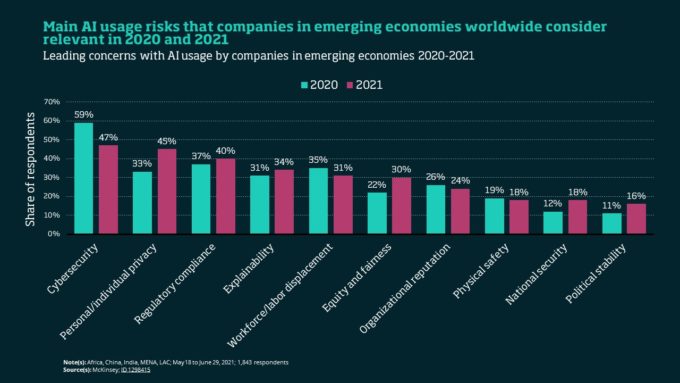
Stress busters: how to help employees help themselves
Dr. Rachel Lewis explores how empowering teams to co-create solutions can reduce workplace stress and boost wellbeing...

by Amit M. Joshi Published May 3, 2022 in Technology • 5 min read
COVID-19 has done nothing to slow down business’s adoption of artificial intelligence (AI); if anything, it looks like it has accelerated. According to one recent study of US-based data and AI executives, the number of companies that have deployed AI has more than doubled over the past year, from 12% in 2021 to 26% today.
AI is being used across the organization – from warehouse and supply chain management to procurement. And it is rapidly going to become even more common: the same study found that 96% of companies have AI initiatives at pilot or test stages, and 92% are increasing their investment in data and AI.
But concerns about AI’s potential impact have not gone away. Often, these come from the perceived threat to jobs: one person’s efficiency gain is another’s lost income. Forty per cent of professionals in leading economies are concerned that their jobs could be lost to AI in the next five years, according to a 2021 study by enterprise application specialists IFS. In the US, it goes up to 62%.
This could be a big problem for businesses. Most business transformations fail, and they are even more likely to go wrong if employees are fearful and resistant. Successful AI projects include as part of the project team the people who are going to be using the tool – whether they are in the warehouse, in the workshop, on the manufacturing floor, or in the sales team. If they are not involved from the start, it is usually a disaster.
One high-end hotel chain implemented an AI system, at significant expense, with the aim of improving its understanding of its guests and boosting discretionary spend. But the employees who were working on hotel reception desks – the very people expected to use the system – were not told it was being put in place. They had no idea how to use the new system and no idea how to re-input data. The system collapsed.

By laying the groundwork for engaging employees, CHROs can play an important role in avoiding this kind of disaster. They have three things to do. First, they need to counter common fears and put nervous minds at rest. Many employees have a straightforward, visceral fear of AI: “It’s coming for my job.” So a vital starting point is stripping away the hype about AI’s scope.
This dovetails with the CHRO’s second task: to inject some realism into the discussion. Among the more extreme reactions to AI are from those people who see it as something like “Skynet” from the Terminator movie franchise, but in the business world it is nothing like that. So HR needs to explain in straightforward, practical terms how AI will be used in the business.
The third task is to build understanding of AI’s positives. Automation and AI are brilliant tools for cutting out the “Four Ds”: tasks that are dull, dangerous, dirty, and dear. There is a real upside in freeing employees to focus on more creative and rewarding work.
To communicate these messages, CHROs need to encourage dialogue with employees. Blanket emails to thousands of people across the company will barely be read. Instead, HR should work alongside line managers to support them to have direct conversations with employees who might be affected by AI implementation.
Line managers are in a better position to explain to their teams how AI tools might change and enhance what they do, and highlight the positives while addressing individuals’ fears sensitively. They can also be a conduit for passing back common concerns. So HR needs to educate and support those line managers in having those conversations. At the same time, they will have to develop policies to support those whose jobs are affected by new technologies, such as opportunities for reskilling, upskilling, and redeployment.
The other people CHROs must work with are chief technology officers or chief data officers and their teams. A closer relationship than in the past will help HR to find out exactly how automation and AI are being used within the organization.
Underpinning these new relationships is education: CHROs will need to develop a basic practical understanding of how AI can be used. Reading around the topic can help, as can engaging with technology experts within the business.
AI is going to become even bigger news in the coming years. But organizations will struggle to make AI a success without their workforce on board – and for that, they need their CHROs.

Professor of AI, Analytics and Marketing Strategy at IMD
Amit Joshi is Professor of AI, Analytics, and Marketing Strategy at IMD and Program Director of the AI Strategy and Implementation program, Generative AI for Business Sprint, and the Business Analytics for Leaders course. He specializes in helping organizations use artificial intelligence and develop their big data, analytics, and AI capabilities. An award-winning professor and researcher, he has extensive experience of AI and analytics-driven transformations in industries such as banking, fintech, retail, automotive, telecoms, and pharma.

June 23, 2025 • by Rachel Lewis in Human Resources
Dr. Rachel Lewis explores how empowering teams to co-create solutions can reduce workplace stress and boost wellbeing...

May 13, 2025 • by Luca Condosta in Human Resources
The CDO, formerly a figurehead for regulatory compliance, is now a key driver of company strategy. Luca Condosta describes the essential skills that CDOs require to turn DE&I concepts into actual commercial...

April 30, 2025 • by Manju Ahuja in Human Resources
The pandemic sparked a shift to remote work that’s proving hard to reverse. According to Prof. Manju Ahuja, hybrid models are the new norm—driven by employee expectations, technological advances, and a changing...

April 29, 2025 • by Michael D. Watkins in Human Resources
Use this diagnostic tool and roadmap to rebuild trust and confidence within dysfunctional teams – the first crucial steps toward a future of high performance....
 Audio available
Audio availableExplore first person business intelligence from top minds curated for a global executive audience